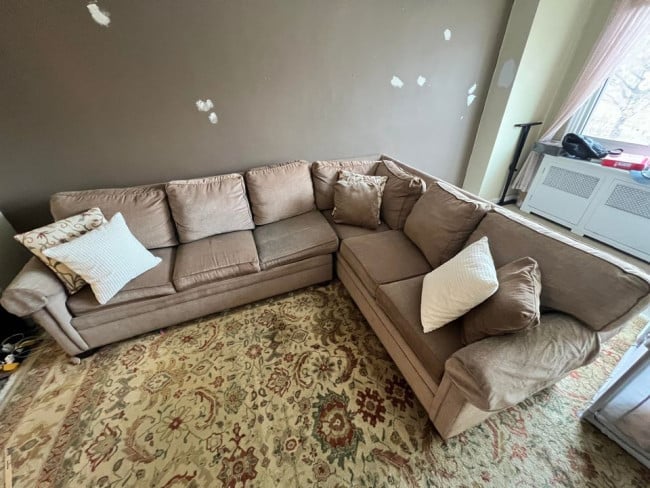Empty nester checklist: What to consider if you are buying or renting in NYC
- Empty nesters flock to NYC for convenience, culture, and proximity to adult children
- A first step is to talk to a financial planner to help determine how much you can afford

Some empty nesters are returning to NYC, others are moving here for the first time to be near their grown children.
iStock
It’s not just the younger set that heeds the siren call of New York City. Empty nesters are finding that downsizing and moving to an apartment in the city fits their lifestyle, one that is less tethered to work and responsibilities and more centered on fun and entertainment, especially if you’re retired or semi-retired.
Some empty nesters who are returning to the city lived here when they were younger. Others are moving to NYC for the first time, often to be near their grown children.
"It used to be [adult] kids would move to the suburbs. Now we're seeing the reverse effect in New York," said Annette Holmgren, an agent at Keller Williams NYC. "People are coming back to be near their kids."
Whether it's the convenience and culture, the desire to be near children or grandchildren, or a decision to downsize from a house in favor of a full-service apartment, NYC has a lot to offer to the empty nest crowd.
Still, it’s a big move to make and it’s best to do your homework, no matter how familiar you are with the city. Brick talked to real estate professionals to find out what empty nesters should consider before buying or renting in NYC. Here's what they advised.
[Editor's note: A previous version of this article ran in January 2018. We are presenting it again with updated information for August 2025.]
1. Get your finances in order
A first step is to talk to a financial planner to help determine how much you can afford. If you're planning to rent, know that landlords prefer renters who make an annual salary of 40 times the monthly rent. If you're still working and meet that standard, you’re in luck.
But if you're working part-time, retired, or your credit score is less than perfect, you may need to enlist the services of a guarantor, who can be a high-earning individual or an institutional backer, to guarantee your rent if you stop paying.
"We understand that some applicants may no longer have traditional employment income,” said Joe Porritt, director of leasing and marketing at The Brodsky Organization, the developer of 499 President St., a new 350-unit rental development in Gowanus, Brooklyn.
“Our application process considers a variety of financial indicators, including income, assets, credit history, and other supporting factors,” Porritt said. If the renter is retired, passive income from investments, pensions, or retirement funds will be considered.
“The goal is to get a full picture of someone’s ability to meet rent obligations, regardless of whether their income is active or passive,” he said.
2. Find the neighborhood that's right for you
In some cases, this might already be determined, if the priority is proximity to family. But generally speaking, the Upper East and Upper West sides tend to be good fits for older people, thanks to their comparative tranquility. Big draws include Lincoln Center, the 92nd Street Y, museums on the Upper East Side, and Central Park.
Want to branch out beyond the beaten track? Brick has you covered with in-depth articles on many NYC neighborhoods.
For empty nesters moving to be near their children in Brooklyn, Porritt recommends Gowanus, an evolving area between Park Slope and Cobble Hill, two very in-demand (but expensive) neighborhoods. Gowanus offers “access to dining, public transportation, and Prospect Park,” he said.
Danielle Nazinitsky, an agent at Decode Real Estate, recently hosted an open house in the Clinton Hill section of Brooklyn and the majority of visitors were empty nesters. “They want elevator buildings with low monthlies," she said—the latter is more readily available in Brooklyn than Manhattan.
She said that luxury condo developments like 58 St. Marks Pl. and 323 Bergen St.—both are in Boerum Hill by developer Avdoo—draw empty nesters looking to move near their adult children in Brooklyn.
“They’re looking for a life of ease now after decades spent working and raising families,” Nazinitsky said. “Brooklyn won thanks to lower monthlies than Manhattan.”
3. Be realistic about the space you need
You may know you're done with the three-bedroom co-op or house and all the work that comes with it, but be careful about overzealous downsizing. For example, if you and your spouse are moving from a four-bedroom house, a one bedroom in a new, modern development might seem like a fresh start but feel cramped after a year or two. You may fare better with a large, older, renovated unit.
It's also important to manage your expectations about the amount of space you can get for your money. Holmgren finds clients moving within the city to be more realistic about their options than first-time buyers from outside New York.


4. Decide what amenities are important
Many NYC buildings have attractive amenities like 24-hour doormen, on-site gyms, roof decks, party rooms, even golf simulators and much more. All of it can be very enticing, at least initially.
Having a doorman to receive packages is typically a top choice for the convenience factor, however, Holmgreen said her most requested feature is outdoor space of some kind. The sentiment is: "We gave up a lot but we still want a place to have a glass of wine," she said.
If you’re used to entertaining at home, but think an apartment will be too small to host your gatherings, look for buildings with common areas that you can use. New developments often have common areas that you can use for private gatherings. THE 74, a new development at 201 East 74th St. on the Upper East Side, for example, has a private dining room and catering kitchen.
5. Weigh renting vs. buying
It's important to think about your timeline. If you see yourself staying long term, buying may be the right choice. If that’s the case, you may need to brush up on the difference between a condo and a co-op—the latter is typically less expensive but comes with more restrictions, for example, on financing, liquidity, renovations, and subletting.
For renters, living in a rental building (as opposed to renting a condo) is the more prudent move, according to the professionals we spoke to, due to the stability. In a condo, the owner may decide to sell, and you're out of a place to live.
Porritt made the case for renting. After spending decades investing in a home, renting means “no more repairs, upkeep, property taxes or long-term commitments.”
But to Barbara Russo, an agent at Douglas Elliman who is leading sales at THE 74, “the rental market is crazy.”
Manhattan median rent has hit new records five times in the past six month; in July Manhattan median rent reached $4,700, according to the Elliman Report.
It makes more sense for empty nesters who are retired to buy, “and most are paying all cash,” she said.
If you're an owner considering renting to an empty nester but concerned they may be high maintenance, Nazinitsky argued the opposite is true because “they have a lifetime of experience and often know what to do if something goes wrong.”
Plus, they’re often away, she said. “Many have another residence or they’re busy helping their kids so they're not even spending a lot of time at home,” she added.
6. Think about accessibility and aging in place
An elevator is often a must-have and other accessibility issues, or being able to accommodate them in the future, may be worth thinking about. For example, does the building have a ramp? Are there features in the apartment that would become problematic if you developed a mobility issue? Would you be able to make renovations to accommodate any special needs?
Having someone on call provides peace of mind as well. Living in an upscale NYC apartment building means you have support from building staff, Russo said. There’s no need to lift anything heavy.
“Someone is always just a phone call away and with 24/7 staff, it puts their adult children at ease,” she said.
7. Determine your transportation needs
Being near public transportation is often a key consideration when deciding on a place to live in NYC, especially if you're still working. But if you don’t need to get to Midtown or another business districts on a daily basis, you can expand your search to a broader area.
Holmgren says that ride-share apps have become a game-changer for people who don't need to commute daily. Some suburbanites moving to the city have a hard time giving up the car entirely, and instead choose to downsize from two or three vehicles to just one.
If you plan on keeping a car in the city, learn NYC alternate-side parking and street cleaning rules or factor in a garage or parking space arrangements in your search.
—Earlier versions of this article contained reporting and writing by Mimi O’Connor.
You Might Also Like






























